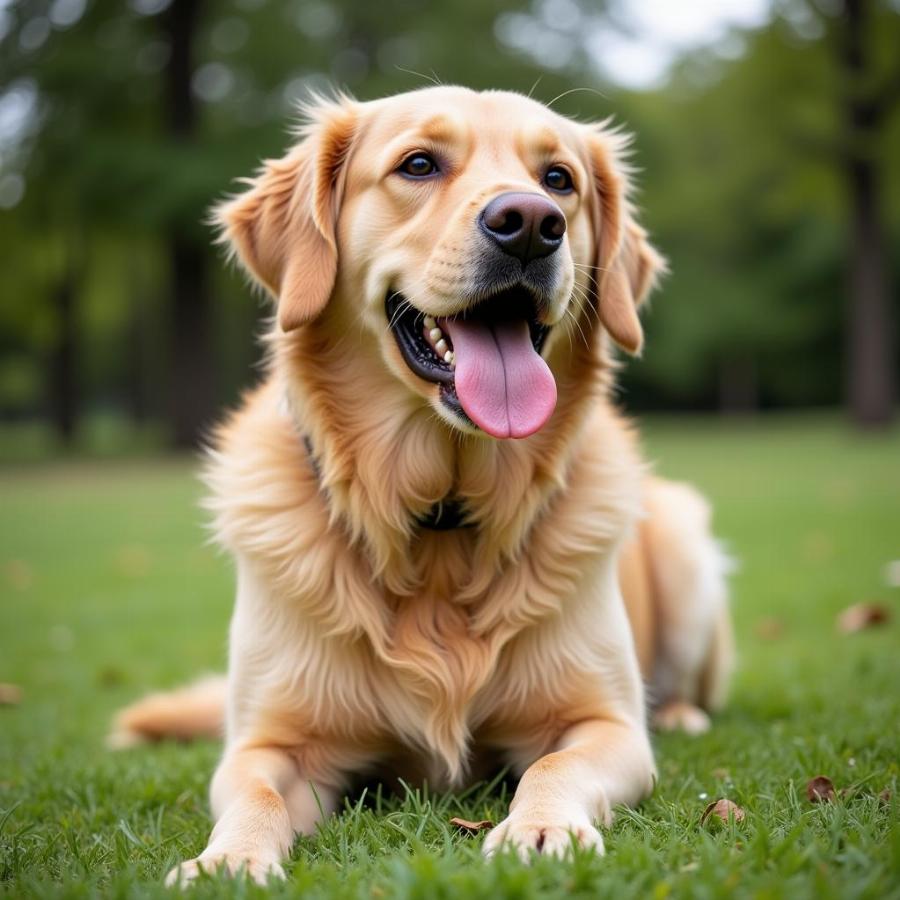As a loving dog owner, it’s natural to be concerned when you notice your furry friend breathing fast while resting. While rapid breathing can sometimes indicate a serious problem, it’s often a normal physiological response. This article will guide you through the potential reasons for your dog’s fast breathing and help you determine when it’s time to seek veterinary attention.
Understanding Normal vs. Abnormal Breathing
Before you panic, it’s important to establish what constitutes normal breathing for a dog. Unlike humans who primarily breathe through their noses, dogs rely heavily on panting – rapid, shallow breaths with their mouths open – to regulate their body temperature.
A normal resting respiratory rate for a dog is typically between 10-30 breaths per minute. However, factors like breed, size, age, and activity level can influence this range. Smaller breeds and puppies tend to have faster respiratory rates than larger, older dogs.
Signs of Abnormal Breathing:
While some panting is normal, excessive or labored breathing, especially when accompanied by other symptoms, can be a red flag. Look out for these warning signs:
- Struggling to Breathe: Noticeable effort required to inhale or exhale, often with exaggerated chest movements.
- Unusual Noises: Wheezing, gasping, or gurgling sounds during breathing.
- Blue or Pale Gums: A sign of inadequate oxygen supply (cyanosis).
- Collapse or Fainting: Can indicate a severe respiratory distress.
- Excessive Drooling: May suggest difficulty swallowing or anxiety.
If you observe any of these signs, it’s crucial to contact your veterinarian immediately.
Common Reasons for Fast Breathing in Dogs at Rest
Several factors can cause a dog to breathe fast while resting, ranging from benign to serious medical conditions. Here are some common culprits:
1. Heat and Overexertion
Dogs don’t sweat like humans do; they pant to cool down. If your dog has been playing fetch in the sun or enjoying a vigorous walk, it’s perfectly normal for them to pant rapidly to regulate their body temperature. Similarly, if the weather is hot and humid, your dog may pant more than usual even without strenuous activity.
 Dog panting after playing fetch
Dog panting after playing fetch
What to do: Offer your dog fresh, cool water and encourage them to rest in a shaded or air-conditioned area. Avoid further strenuous activity until they’ve had a chance to cool down.
2. Stress or Anxiety
Just like humans, dogs experience stress and anxiety. A trip to the vet, a new houseguest, or even loud noises like fireworks can trigger a stress response in your dog, leading to rapid breathing.
What to do: Identify and minimize the source of stress. Create a calm and safe space for your dog, perhaps with a familiar blanket or toy. Consider calming aids like pheromone diffusers or calming treats.
3. Pain or Discomfort
Pain is another common reason for rapid breathing in dogs, even at rest. If your dog is injured or suffering from a medical condition, they may pant heavily as a physiological response to pain.
What to do: Carefully examine your dog for any signs of injury, swelling, or discomfort. If you suspect your dog is in pain, contact your veterinarian immediately.
4. Underlying Medical Conditions
In some cases, rapid breathing can be a symptom of a more serious underlying medical condition, such as:
- Respiratory Infections: Kennel cough, pneumonia, and other respiratory infections can cause inflammation and fluid buildup in the lungs, making it difficult to breathe.
- Heart Disease: As heart function declines, fluid can build up in the lungs, leading to difficulty breathing, especially during rest.
- Anemia: This condition, characterized by a low red blood cell count, reduces the blood’s oxygen-carrying capacity, forcing the body to work harder to compensate.
- Cushing’s Disease: An overproduction of cortisol in this hormonal disorder can lead to increased thirst, urination, and panting.
What to do: If you suspect an underlying medical condition, consult your veterinarian for a proper diagnosis and treatment plan.
When to Seek Veterinary Attention
While occasional rapid breathing is usually not a cause for concern, it’s essential to consult your veterinarian if:
- Your dog’s breathing is consistently rapid or labored, even at rest.
- You observe any other symptoms like coughing, lethargy, loss of appetite, or blue gums.
- You suspect your dog may be injured or in pain.
Beaut Dogs: Your Partner in Pet Care
Beaut Dogs is your go-to resource for all things dog-related. We provide reliable, insightful, and in-depth information about the canine world to help you be the best pet parent you can be.
For personalized advice and support, reach out to us at [email protected]. We’re here to help!